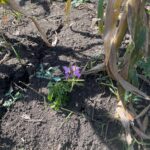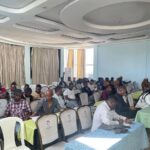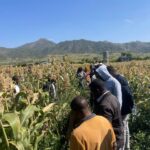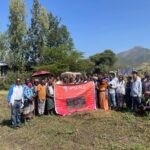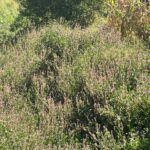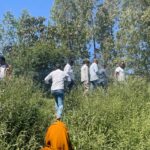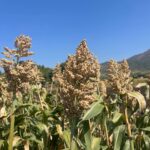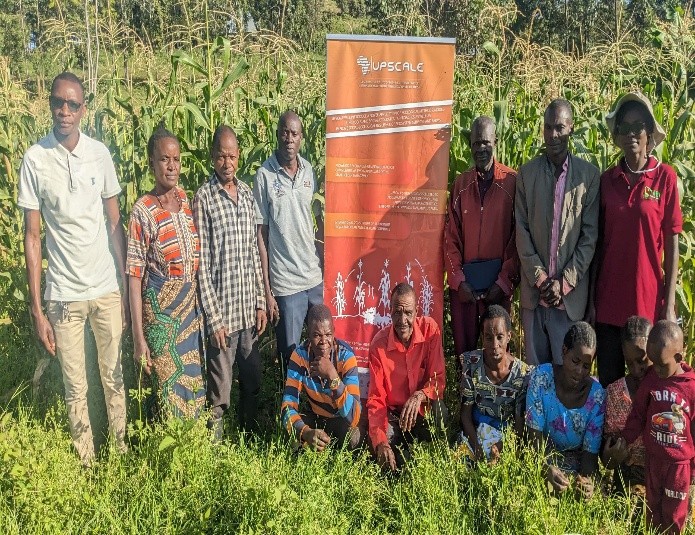As the UPSCALE project started back in 2020, besides national and regional meetings, field days were the main point for bringing together farmers, researchers, and stakeholders to share knowledge and showcase innovative practices. The Field Day, organized by the UPSCALE project and colleague Andargachew Detebo, held on 16th November 2024 in Dawachefa Wereda, Bedeno Kebele, aimed to showcase the latest advancements in sustainable agricultural practices, with a particular focus on the Push-Pull Diversification research. This event demonstrated the impact of Push-Pull technology in increasing productivity in maize and sorghum fields, as well as gathering valuable insights and feedback for improving implementation and outreach across the region.
The Push-Pull Diversification Research
The UPSCALE partner, icipe, has made significant progress in Ethiopia since the Push-Pull technology (PPT) introduction five years ago. With over 8,000 farmers now utilizing the method, the technology has proven to be highly effective in increasing crop yields, boosting farmers’ incomes, and promoting environmentally sustainable practices.
The highlight of the field day was therefore on the Push-Pull Diversification strategy, which ranked as one of the most unique approaches to increasing productivity while leaning on sustainability. The PPT requires the intercropping of certain plants like Napier grass, and Desmodium amongst the maize and sorghum for pest control, improvement on the soil and overall production. This strategy focuses on some of the biggest problems affecting farmers: pest control and decline in soil fertility through the use of a natural solution which also reduces the use of chemical pesticides or fertilizers.
Demonstrating Impact: Push-Pull Technology in Action
In the Farmers Training Center, organizers ensured to showcase that the PPT is not only effective in improving agricultural productivity but also beneficial to local communities. Maize and sorghum fields were used to illustrate how the integration of Napier grass and Desmodium between crops helps to naturally repel pests and enrich the soil. This way, participants were able to witness directly how PPT works to increase yields at the same time it is making farming more sustainable and healthy. Mr. Andargachew, ISD UPSCALE Project Coordinator, explained the diversification research plots and participants saw the broader effects, including its impact on local economies, food security, and sustainable livelihood.
Afterwards, participants gathered to engage in the Post-Field visit discussion session led by Ato Ghebremedhin, Executive Director of ISD, and Ato Yarega, Crop and Agricultural Extension Team Leader from the Federal Ministry of Agriculture. Farmers were provided with a Push-Pull brochure, which offered detailed insights into the technology, its benefits, and practical advice on how to implement it on their own farms. This resource aims to equip farmers with the knowledge they need to adopt and benefit from PPT while reducing their environmental footprint.
Gathering Feedback and Insights from Stakeholders
One of the main goals of the field day was to gather feedback from a diverse group of participants. This interaction served to identify challenges, opportunities, and areas for improvement in the implementation of Push-Pull technology (PPT). The feedback will be invaluable in refining the approach and enhancing the outreach efforts of the UPSCALE project. It will also help inform future training programs, ensuring that farmers across the region have access to the resources, support, and knowledge needed to adopt sustainable agricultural practices.
This valuable exchange of ideas and insights made the field day in Dawachefa Wereda, Bedeno Kebele, an important milestone in advancing sustainable farming practices across East Africa. By demonstrating the practical benefits of Push-Pull technology, the event highlighted its potential to increase productivity, reduce environmental impact, and promote long-term agricultural resilience. The event not only showcased the success of the technology in real-world farming environments but also emphasized the importance of collaboration between farmers, researchers, and stakeholders in driving innovation. As the project continues to expand, it is clear that such initiatives will play a crucial role in African agriculture, empowering farmers with the tools and knowledge to thrive.
-
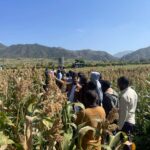
- Mr. Andargachew, ISD UPSCALE Project Coordinator, Explaining the Diversification Research Plots to Invited Guests
-
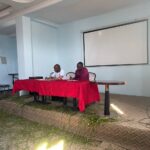
- Discussion Session Following the Field Visit, Led by Ato Ghebremedhin, Executive Director of ISD, and Ato Yarega, Crop and Agricultural Extension Team Leader from the Federal Ministry of Agriculture


